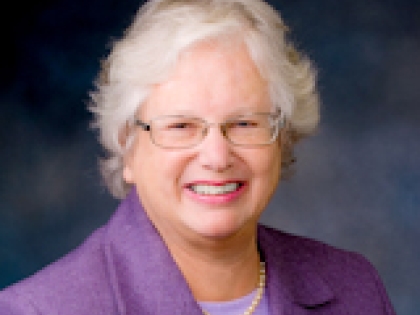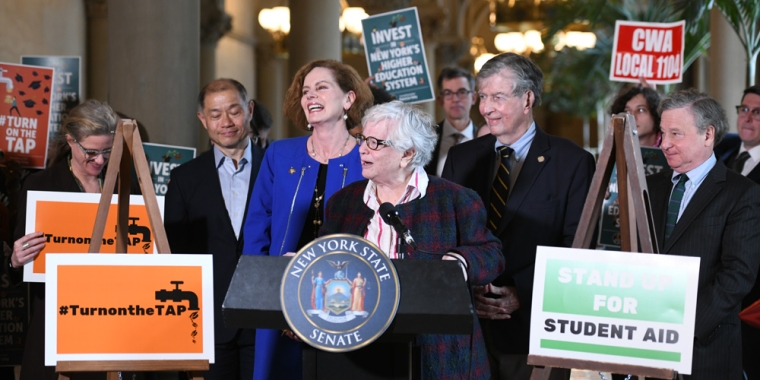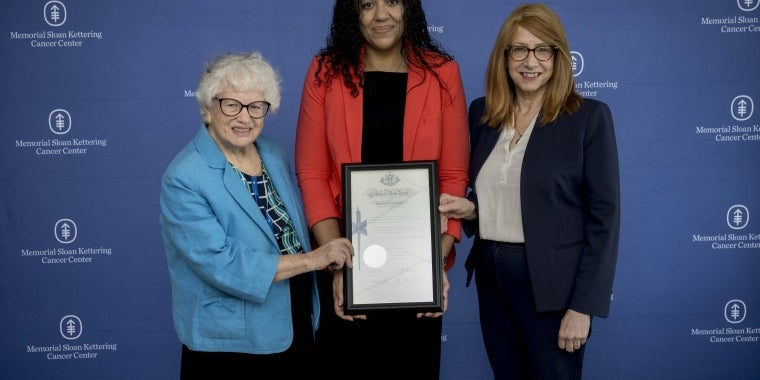
Senate, Assembly Higher Education Committees United in Push for Landmark Investments in Final NYS Budget
March 20, 2024

Senator Toby Ann Stavisky speaks at #TurnOnTheTAP press event.
ALBANY, NY (Mar. 20) – With the final FY2025 New York State budget due in 10 days on April 1, 2024, Chairs of the Higher Education Committees in the New York State Legislature, Senator Toby Ann Stavisky and Assemblymember Patricia Fahy, were joined by Higher Education Committee Members from both Houses and advocates to urge that provisions found in both the Assembly and Senate one house budget resolutions are included in the final budget agreement.
Proponents highlighted the provisions that were included in both the Assembly and Senate one house budget resolutions, and urged their inclusion in the final FY2025 budget:
Tuition Assistance Program (TAP) — A $118M (Assembly) or $138M (Senate) increase to:
o Raise income thresholds:
§ From $80,000 to $125,000 for dependent students
o Provide part-time TAP to proprietary college students.
o Increase the minimum award from $500 to $1000.
Operating Aid:
o SUNY: $186.5M, including $100M for additional operating support.
o CUNY: $124M, including $67M (Senate) or $75M (Assembly) for additional operating support.
Capital Funding:
o SUNY: $820M over executive proposal, for total of $2.1B
o CUNY: $535M (Assembly) or $620M (Senate) over executive proposal, for a total of at least $976.2M
Additionally, while not included in both one house budget resolutions, lawmakers urged the following provisions be included in the final budget:
Assembly one house:
o Extend TAP eligibility from four to five years.
o Raise the TAP maximum threshold to $60,000 for married independent students and to $30,000 for single independent students.
Senate one house:
o Fully eliminate the distinction between independent and dependent students.
o Increase the maximum award from $5,665 to $6,165.
o $6 million for the CUNY Medical School.
o $150 million restoration in the SUNY Hospital Capital funding.
Prior to 2011, New York would increase the maximum TAP award to match the state’s public college tuition rate, until it was decoupled that same year. Since then, tuition growth has steadily outpaced increases in the maximum TAP award. In 2010, SUNY tuition was $4,970 for in-state residents, and the maximum TAP award was $5,000. Today, SUNY tuition is more than $7,000, but the maximum TAP award has only been raised to $5,665 and the maximum TAP income threshold of state taxable income has remained at $80,000, falling short of one-third of its modern-day value.
TAP’s maximum income threshold was last raised from $50,500 to $80,000 in 2000, almost a quarter-century ago. At a time when more than 70% of students cite cost as a barrier to attending college, TAP’s funding has not kept pace with rising tuition, enrollment, inflation, and the growing cost of living, forcing students and families dependent upon TAP to shoulder a growing financial burden.
Additionally, lawmakers urged a continuation of the increases secured last year in operating aid for SUNY and CUNY systems, to make critical investments that will help boost enrollment and ensure their fiscal health and longevity. This year, the Albany Times Union reported that SUNY projects a $1 billion deficit over the next 10-year period without significant investments. SUNY alone has a $28 billion annual economic impact in New York and for every dollar spent on SUNY, the state gets an $8.17 return on investment. Additionally, New York State Comptroller Tom DiNapoli released a report this month detailing the financial, enrollment, and systemic challenges many institutions of higher education are grappling with across the state.
Finally, in light of the Supreme Court of the United States’ decisions on rolling back affirmative action and student debt relief, it is more important than ever that New York double down on efforts to improve college affordability for middle- and low-income students and families, students of color, and those from disadvantaged backgrounds.
“This year’s one house budget proposals expand and grow student opportunity, invests in badly needed student aid and tuition assistance, and ensures continued progress on increasing funding for our SUNY and CUNY systems,” said Assemblymember Patricia Fahy, Chair of the Assembly’s Standing Committee on Higher Education. “Investments in operating and capital aid for SUNY and CUNY, and in the Tuition Assistance Program (TAP) will ensure that more students, regardless of background, can achieve their dream of accessing a higher education. As we grapple with declining population, college closures, and chronic workforce shortages, addressing affordability – especially when more than 70 percent of students cite cost as the major barrier to attending college – is now more critical than ever to expand opportunity to middle class and low-income families. This year, we must make strong, meaningful investments to #TurnOnTheTAP, fund SUNY and CUNY, and usher in a new era for higher education in New York State.”
“Our Senate One-House budget resolution provides a historic investment for our college students,” said Senator Toby Ann Stavisky, Chair of the Senate’s Committee on Higher Education. “Our proposal helps middle income students by significantly raising the maximum household income eligibility from $80,000 to $125,000. It also increases the maximum amount from $5,665 to $6,165 and increases the minimum award by $500 to $1,000. Our students are the future of our city and our state. This investment is important because we want students to stay in New York, work in New York, pay taxes in New York and become active in their communities. Together we must turn on the TAP.”
“The Tuition Assistance Program has helped New Yorkers pursue higher education opportunities for fifty years, but we must make sure it remains an effective tool by ensuring access for more students,” said Chair of the Assembly’s Subcommittee on TAP, Assemblymember Sarah Clark. “This starts by expanding the income eligibility to include more families and increasing the minimum award for participants, as proposed in the Assembly one-house budget. We have the opportunity for the first time in decades to increase our investment in the future of more New York students, while not breaking the bank for our families. We must get this done in the budget this year.”
"Expanding TAP to part-time students and raising income thresholds isn't just about numbers; it's about broadening access to education,” said Senator Robert Jackson. “We're investing not only in tuition but also in the aspirations of every New Yorker pursuing a brighter future, ensuring that every aspiring mind, regardless of circumstance, can thrive and contribute. Investing in education isn't an expense; it's an investment in our collective future."
“TAP is a critical investment in our future that gives students of all ages access to an affordable higher education,” said Senator John Liu. “The state legislature knows that expanding eligibility means more low- and middle-income students have an opportunity to reach their full potential, and that’s why we must make sure these expansions are included in the final budget.”
"The income limit for TAP eligibility has remained stagnant at $80,000 for over 20 years. In the face of COVID-era inflation that has eaten away at family budgets and pushed higher education out of reach for too many of our youth, it is imperative that we bring the TAP program’s eligibility criteria and award amounts into alignment with current economic realities,” said Senator Neil Breslin. “This modest investment will brighten our children’s futures and ensure that our state’s workforce is able to meet the challenges of tomorrow."
“The Tuition Assistance Program (TAP) Expansion will provide equity in higher education and provide further financial aid to students,” said Assemblymember Khaleel Anderson. “Since its inception in 1974, TAP has provided nearly 30 billion dollars to help more than 6 million New Yorkers to help make college more affordable and accessible. During the 2022-
23 academic year, 234,000 New Yorkers were awarded more than $662 million in tuition assistance awards. This expansion comes on the heels of other education reforms including expanding TAP for part-time students, reestablishing TAP for incarcerated individuals, and banning the practice of transcript withholding. As a Queens College CUNY graduate, I strongly encourage further expansion to enable students of color to pursue a college degree.”
“TAP is a critically important tool to break down financial barriers to education and end generational poverty and systematic discrimination,” said Assemblymember Anna Kelles. “Expanding TAP will also give us the ability to address worker shortages in many essential service fields across multiple workforce sectors. A robust TAP package will expand eligibility for a wider economic range of families, provide financial support that more closely matches current educational costs, and create flexibility for students who are forced to temporarily leave their educational program for issues such as personal health, family health, and family finances. Increased access to TAP funding will ensure that New Yorkers have the opportunity to pursue their academic aspirations without undue financial strain.”
“Maintaining a quality and affordable higher education system is vital to the future of our state,” said Assemblymember Monica Wallace. “Our universities produce the skilled workforce that employers rely on. They are also economic drivers of both our state and local communities, as demonstrated by the fact that every dollar invested in SUNY campuses generates more than eight-fold that amount in economic impact. To advance our economy and provide opportunities for all, we must adequately fund our state university system.”
“We thank the Senate and Assembly for their strong support of SUNY and for recognizing the necessity of properly funding our campuses to reverse more than a decade of drastic budget cuts and underfunding,” said United University Professions President Fred Kowal. “Expanding SUNY’s Tuition Assistance Program will help make tuition affordable for many more students. We also thank legislators for operating aid increases for SUNY in their one-house budgets. We hope this funding is included in the final enacted budget and that it is directly allocated to our financially troubled campuses to close budget deficits.”
“We stand proudly with Senate and Assembly Higher Education Chairs Stavisky and Fahy, with our fellow academic unionists, advocates, and legislative allies in calling for significant additional investments in public higher education and financial aid. CUNY changes lives and benefits the state’s economy. A vibrant, well-funded CUNY system, accessible to all, with fully staffed senior and community colleges, robust wraparound student supports, and the power to uplift communities is our goal! The final budget for FY2025 can help get us there if the provisions of the Senate and Assembly one-house resolutions are included in it,” said James Davis, President of the Professional Staff Congress, the union representing the faculty and professional staff of CUNY.
“I commend the Assembly and Senate for investing in students as we mark the 50th anniversary of the Tuition Assistance Program (TAP). TAP has helped over six million New Yorkers achieve their dream of a college degree. This much-needed expansion will enhance access to higher education for thousands of students, and Independent Sector campuses will continue to match this investment.” said CICU President Lola W. Brabham.
“Assemblymember Fahy and Senator Stavisky have proposed bold measures to reinvigorate and expand this program to serve more lower- and middle-income families across the state. CICU is proud to be part of the #TurnOnTheTAP campaign to ensure that TAP continues to be transformational for millions of New York’s college students.”
"On behalf of the Association of Private Colleges, I would like to extend my sincere appreciation to our Higher Education Committee chairs, Senator Stavisky and Assemblymember Fahy, for all of the important work they do to support our students. Over the past 50 years, the state's Tuition Assistance Program (TAP) has helped students pursue a path they may not have thought possible and with recent momentum to expand eligibility to part-time students attending proprietary colleges and increase the income threshold, so many more could have greater opportunities in the future. It is an honor to work alongside the many higher education champions in the Legislature and we hope that this will be the year to make great progress for the students we serve," said Donna Stelling Gurnett, President of New York's Association of Private Colleges.
Share this Article or Press Release
Newsroom
Go to Newsroom